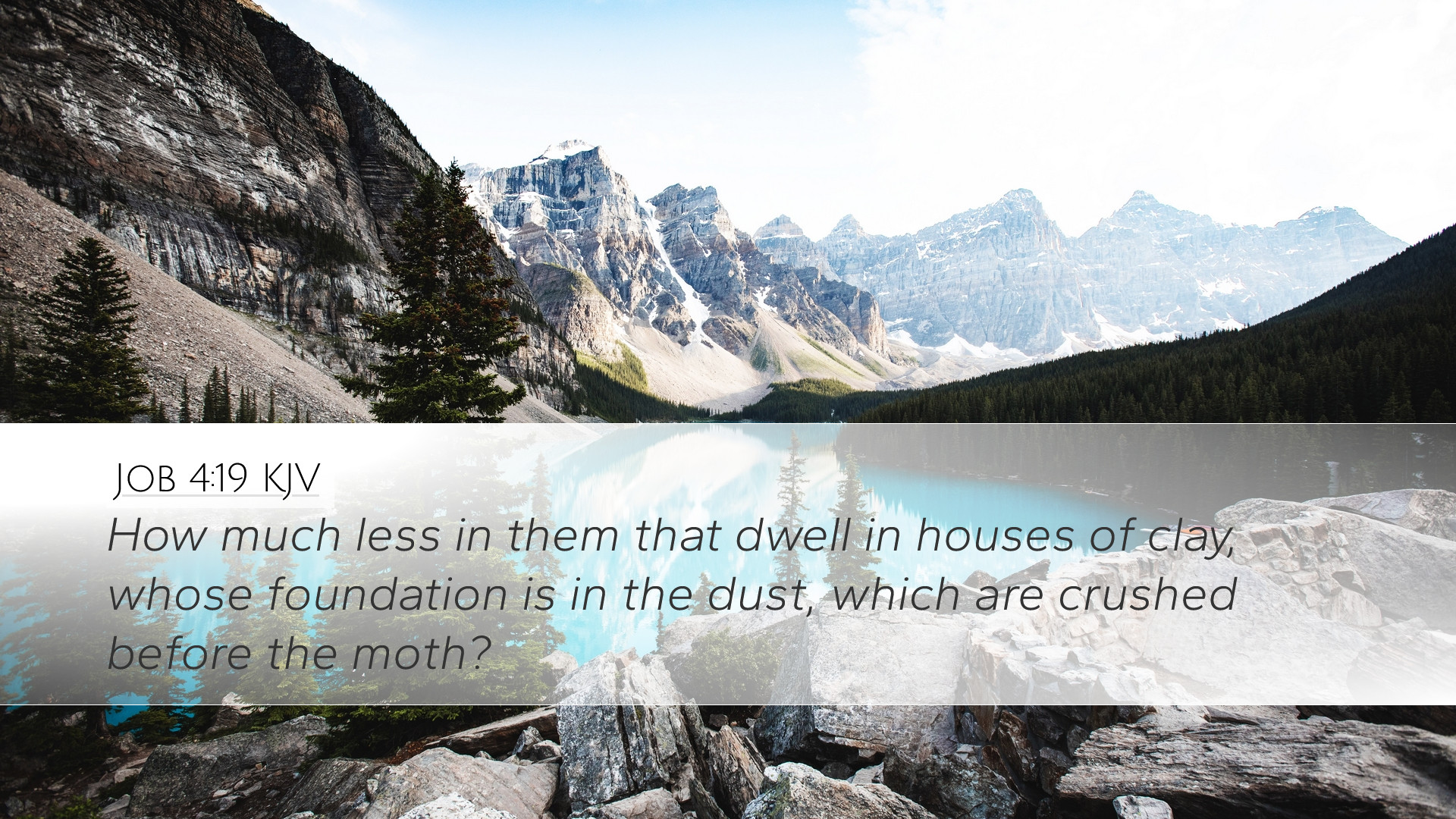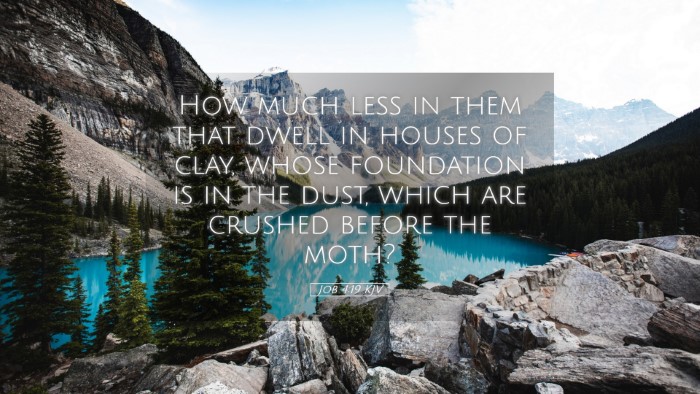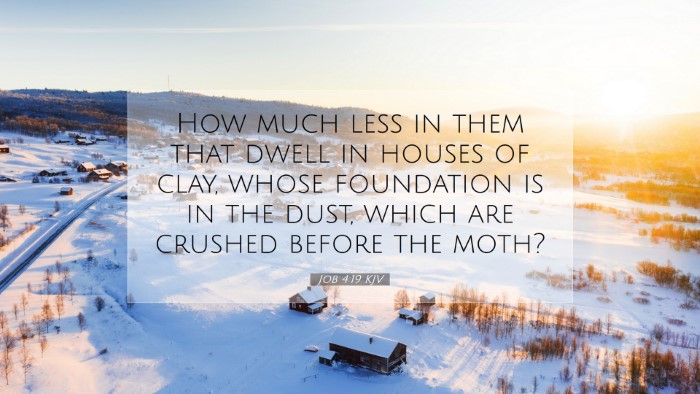Old Testament
Genesis Exodus Leviticus Numbers Deuteronomy Joshua Judges Ruth 1 Samuel 2 Samuel 1 Kings 2 Kings 1 Chronicles 2 Chronicles Ezra Nehemiah Esther Job Psalms Proverbs Ecclesiastes Song of Solomon Isaiah Jeremiah Lamentations Ezekiel Daniel Hosea Joel Amos Obadiah Jonah Micah Nahum Habakkuk Zephaniah Haggai Zechariah MalachiJob 4:19
Job 4:19 KJV
How much less in them that dwell in houses of clay, whose foundation is in the dust, which are crushed before the moth?
Job 4:19 Bible Commentary
Commentary on Job 4:19
Verse: "How much more those who dwell in houses of clay, whose foundation is in the dust, who are crushed before the moth?"
Introduction
The verse Job 4:19 serves as a reflection on human frailty and the ephemeral nature of life. In this passage, Eliphaz the Temanite is delivering a message to Job, asserting the inherent weakness of human beings in contrast with the mighty and eternal God. Insights from several public domain commentaries shed light on the nuances of this verse and its theological implications.
Contextual Background
Job is a narrative that explores themes of suffering, divine justice, and human righteousness. Eliphaz, as one of Job's friends, attempts to address Job's afflictions through an assumed understanding of God's justice. This verse highlights the frailty of humanity and sets the stage for the broader discourse on divine sovereignty.
Insights from Commentaries
Matthew Henry’s Commentary
According to Matthew Henry, the phrase "houses of clay" symbolizes the temporary and fragile nature of human existence. He poignantly comments on how our corporeal bodies are likened to clay, underscoring the idea that we are fashioned from the dust of the earth, which connects to Genesis 2:7. Henry reflects on how this imagery serves to remind humanity of its limitations and the inevitability of death. Furthermore, he notes that being "crushed before the moth" illustrates the insignificance of human power and accomplishments when compared to the eternal purpose of God.
Albert Barnes’ Notes on the Bible
Albert Barnes echoes the sentiment of human frailty, emphasizing the transient nature of life. He points out that a 'house of clay' indicates not only physical weakness but also the moral and spiritual vulnerability of mankind. Barnes emphasizes that since humans are made from dust, they cannot withstand against divine scrutiny and judgment. This acknowledgment of our fragility leads to a deeper understanding of the need for God’s grace and mercy. Barnes also discusses the metaphor of being "crushed before the moth," highlighting the vulnerability of man to both internal and external pressures that threaten existence.
Adam Clarke's Commentary
Adam Clarke adds further depth by considering the implications of the term "foundation." He suggests that the "foundation in the dust" indicates a lack of solid footing; humanity rests on a fragile base, and yet many strive for permanence in a transient world. Clarke extends the metaphor to indicate how quickly life can deteriorate: like moths that consume garments, life can be fleeting and easily destroyed. He points to the overall message that humble recognition of our human condition is vital, encouraging an attitude of dependence on God for strength and stability.
Theological Implications
The implications of Job 4:19 go beyond mere observation; they provoke profound theological reflection. The acknowledgment of our frailty invites humility in the face of divine majesty. Both Barnes and Clarke highlight the importance of recognizing our dependence on God rather than relying solely on our ability to mitigate suffering and avoid existential threats. Eliphaz's assertion serves as a humbling reminder for believers that amidst life’s endeavors, acknowledging human limitations leads one to a deeper reliance on the grace and preservation of God.
- Human Vulnerability: The verse illustrates how every individual, while aspiring toward strength and permanence, ultimately rests on a fragile foundation.
- Divine Sovereignty: God’s authority and power are contrasted with human weakness, encouraging believers to trust in Him during trials.
- Mortal Existence: Eliphaz’s reflections speak to the transient nature of life itself, inviting introspection on the value of spiritual pursuits versus earthly ambitions.
Practical Applications
The insights derived from Job 4:19 have practical applications for pastors, students, and theologians alike:
- Developing Humility: Recognizing our fragility compels us to approach God with humility, fostering a more profound personal relationship.
- Counseling the Suffering: This verse provides assurance to those in distress, affirming that suffering is a universal aspect of the human experience.
- Encouragement to Trust: Emphasizing reliance on God in weaknesses fosters a supportive community among believers, centering on faith rather than self-sufficiency.
Conclusion
In conclusion, Job 4:19 serves as a poignant reminder of the human condition—a reality interwoven with fragility and impermanence. The combined insights from Matthew Henry, Albert Barnes, and Adam Clarke offer a rich tapestry of understanding that transcends mere interpretation. For pastors, students, and theologians, reflecting on this verse not only cultivates a sense of humility but also encourages a deeper reliance on God’s grace and sovereign will. As we navigate this transient life, let us continually seek the eternal truths found within the Word of God, allowing our frailty to lead us closer to divine strength.


